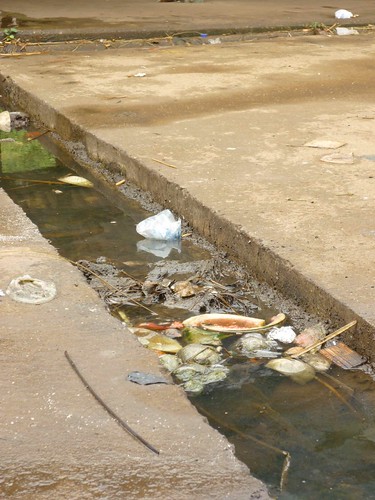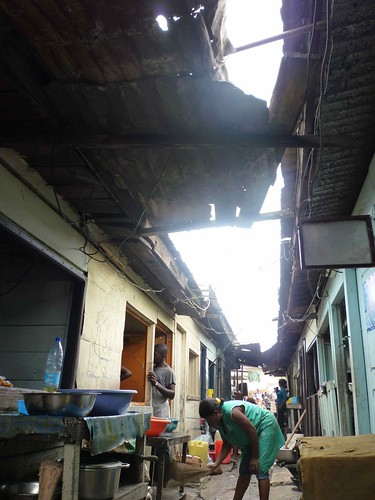The meaning of the title of this week’s post is two-fold—While my intention was to write solely about the immense importance and utility fieldwork has for development, I ended up reflecting on working “sur le terrain,” as well as living it. As a result, I offer you both in two parts.
Part 1: The Work
Last weekend I was with some colleagues who work at STRATEGIES!, the marketing consulting firm that created the AMA Women Project, and had a lively conversation with one girl, Marilyn, who is very passionate about development and the future of her country. We were discussing methods different international institutions use for development work and she could not emphasize enough how critical she felt being on the ground, or ‘in the field,’ was to the success of any development program. ‘Fieldwork’ is a buzzword I’ve heard since I began development studies in school, but it wasn’t until I got here that I realized how vital seeing it really is.
Perception is everything.
From an objective point of view, working with UCOMAS is an exceedingly small, focused endeavor. For example, locals outside of the market and the AMA Project, namely those I’ve met at the Catholic Mission, view Sandaga and the women who work there as relatively unknown, menial and negligible in Douala.
Additionally, in the larger scheme of development work, UCOMAS appears narrow and overly specialized. Vital Voices, an organization that works in Africa, Latin America, Eurasia and the Middle East and North Africa promoting human rights, women’s business networks, women’s political advocacy and female health care, gave grants to 31 projects in 13 countries across Africa through one of several grant programs, the Bill & Melinda Gates Pan African Women’s Advocacy & Leadership Fund. One of those 31 grants went to Mme Kah Walla, director of STRATEGIES!, to launch the AMA Women Project, which intended to train and empower the women of Sandaga Market. L’Union des Commerçantes du Marche Sandaga (UCOMAS) was an outgrowth of the AMA Project, coming together to defend the rights of women traders in the market. In other words, one project in one region funded through one grant program sparked the creation of a women’s association in one market in one city of Cameroon.
When you’re here, though, the view is much different. I can’t put it any other way than just that there is so much to do. The obstacles the women face in the market are daunting. Just to name a few, they are manipulated by market officials, harassed by their male counterparts, deal with deplorable working conditions, have no access to toilets or potable water and are forced to waste large amounts of produce at the end of each day. In an effort to confront all these issues and more, UCOMAS has already drawn up plans for numerous activities, including the construction of toilets inside the market, a cleanliness program that will equip members with brooms to clean their selling spots, installation of a refrigeration unit for conservation of their fresh produce, and several technical and advocacy trainings— again, just to name a few.
To add to the difficulty, the Vital Voices grant is nearly depleted and the contracts enlisting Eric and Annick’s help with the Union end on June 30th. First, Eric and Annick (the managers and facilitators of the AMA Project) played intricate roles in the creation of UCOMAS and are indispensable to its future success. They have taken on so much responsibility and offer so much outside knowledge and expertise that it would be impossible to transmit everything they know to the members of UCOMAS, or even just to the executive board. The association is still in its very beginning stages and without Eric or Annick its future is very uncertain.
Second, as Eric has remarked time and time again, UCOMAS desperately needs long-term investment to help it get off the ground. One of the largest problems plaguing the world of development aid is lack of sustainability, and I fear UCOMAS will be a clear example of why. A short-term grant, while well-intentioned and appreciated, is not sufficient to start a new organization up from scratch. The dangers of offering such help are the repercussions of false promises; because a smaller grant is not enough to create and stabilize a new association, it instead brings in the ideas, expectations and hope for change without adequate means to accomplish it. Then, in the face of disappointment, people become disillusioned and resistant towards future help. The brevity of the UCOMAS grant is not the fault of Vital Voices or the AMA Women Project. In fact, both Vital Voices and AMA achieved what they intended to and then some. However, the fragile state such success has left UCOMAS in is indicative of a disconnect between aid-granting institutions and circumstances in the field.
As Marilyn said, “il faut être sur le terrain,” (It is necessary to be on the ground). And she is so right.
Posted By Helah Robinson
Posted Jun 28th, 2009





